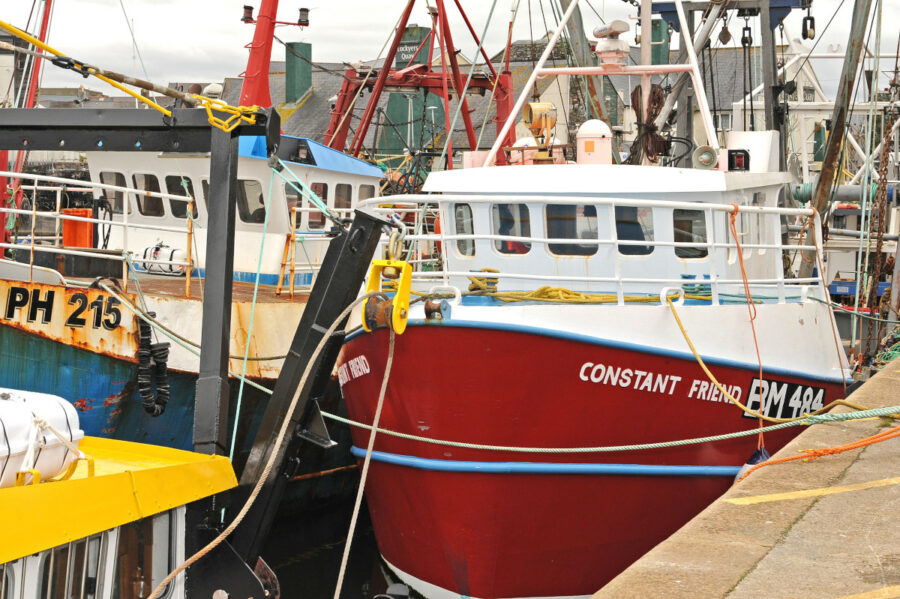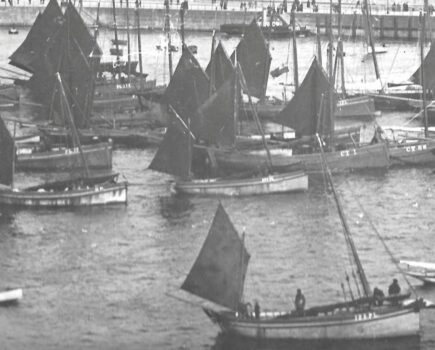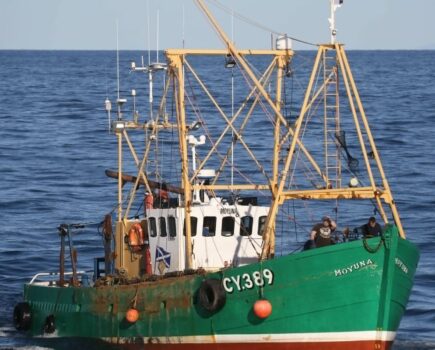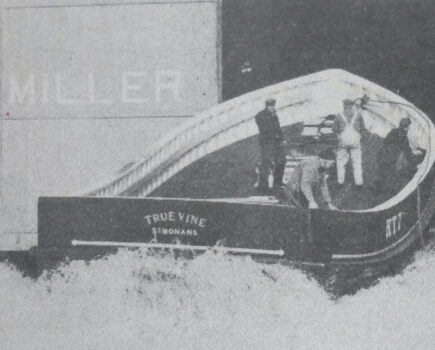A succession of gales in the first three months of the year has severely impacted on landings at the South Devon port of Plymouth. Phil Lockley reports
At ports like Plymouth, continual poor weather has significantly cut the earnings of many South West inshore fishermen since the start of the new year.
Coupled to that, many skippers fear that a not unusual ‘cyclical downturn’ is taking place in the South West mixed fishery. A future boost to their earnings for 2019 is unlikely, reckons the leader of Plymouth Trawler Agents (PTA), Dave Pessell.
He said: “At the moment, fishing isn’t very good at all. The years 2016 and 2017 were very successful for many South West boats, because of the abundance of cuttlefish. It did, however, tend to hide the poor performance of many other stocks in the mixed fishery, particularly in the Channel.
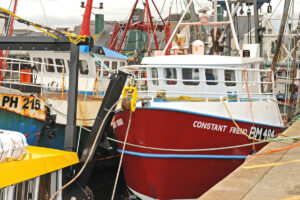
Plymouth is home to a sizeable fleet of day boats and scallopers.
“A most interesting factor from our data is how stocks that have been subject to close scientific study and gear trials, such as Dover sole and plaice, are doing well compared to other valuable stocks that have not been subject to scrutiny. It merely shows that where scientists and fishermen work together, the outcome is likely to be more favourable than the knee-jerk, draconian management measures we have become accustomed to.
“Lemon sole has long been a valuable stock to South West fishermen, but is showing an alarming decline in both quantity and the size composition of the stock. Several years ago, the EU Commission took away the minimum landing size (MLS) for this species. The result of this is that many of the juvenile fish, that were discarded with a reasonable survival rate, are now kept to meet an increasing demand for immature fish, because larger sizes aren’t available. It’s best we don’t say too much about small fish readily available on French and Spanish markets.
“We can only hope that the long-awaited delivery of Brexit will bring us a modern and dynamic system of management more suited to the needs of a wonderful, wild, natural resource that the whole country can benefit from. Nobody imagines it will be easy, but once the MMO accepts the idea that we are partners and customers, sensible management measures should rapidly ensue.
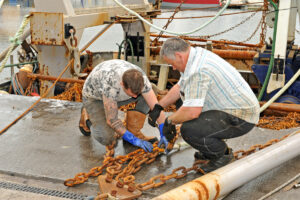
Harry Green (right) and his staff on Plymouth quayside, attending to the gear on the firm’s latest scalloper, Judi G, built by C Toms & Son.
“The recent deplorable catch recording consultation for the under-10s suggests that the MMO has learned very little about sensible management measures and, more worrying still, has no comprehension of the dangers and difficulties of operating an under-10m vessel.
“In similar vein, the MMO continues to avoid the problem of quota share out in the demersal fleet. There is a misconception that this is primarily an under-10m problem, whereas in fact, there are a large number of over-10m owners now reliant on being able to lease fish from the wealthiest in the industry. No one wishes to speak out because of their need to lease fish, but a wild fish stock is a national resource, and deserves far better management than a crude tendering system that just ensures that the whole industry will shortly be in the hands of a few wealthy companies and individuals.
“Figures, taken from PTA auctions, show that last year we were 16% down on the amount of fish auctioned, in comparison to 2017. Effectively, PTA was £3m down, with total fish auctioned dropping from £18.8m in 2017 to £15.8m last year.
“It is a serious drop but, of course, we are really no more than a reflection of the fleet that lands its catches to us. There is still much that the industry could do to try to even out the rollercoaster ride that creates uncertainty for everyone. The successful trials on key stocks in the South West by beam trawlers should be an example to the fleet of what can be achieved. We would hope that the industry will begin to start dictating the agenda on the way forward, rather than be the ‘done-to’ industry it has been from the day it entered the Common Fisheries Policy.”
A sharp upturn in PTA’s figures for the remainder of 2019 is unlikely, but PTA’s confidence in the future is as strong as ever.
Dave Pessell explained, “Regarding the future of the fisheries complex at Plymouth (owned by Sutton Harbour Fisheries), at present we are in negotiation with Plymouth City Council to decide on what sort of development might be possible in the future. Plymouth City Council, Sutton Harbour Company and other fishing interests in this region are also determined to move ahead, and those companies are involved with the talks.
“The fishing industry has been an important part of Plymouth since the 15th century. Plymouth boats were coming back from Newfoundland with salted cod; fishing was so important then, and remains extremely important today.
“While everything has to move on, a successful Brexit, with the UK becoming a true independent coastal state, should ensure a wonderful future for the UK fishing industry. Plymouth Trawler Agents is determined to see a redeveloped fishery complex at Plymouth become part of that wonderful future.”
Continuing fleet investment
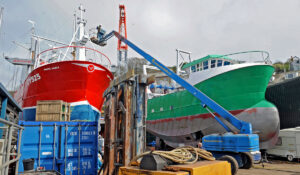
The 15m scalloper White Eagle shortly before being launched by C Toms & Son, alongside the 12m scalloper/trawler which will join the South West fleet soon as Southern Spirit.
While both day boats and beam trawlers of the South West are experiencing poor returns on whitefish, investments in new builds, or buying newer vessels, continues. Even though the cuttlefish boom of previous years has not been repeated, skippers and vessel owners are surprisingly upbeat.
The launch of the latest C Toms & Son scalloper, White Eagle CY 525, took place on 11 April, and will be followed by the 12m trawler/scalloper Southern Spirit for Roger Klyne. That vessel will be based in or near Plymouth, and its launch is expected soon.
While the White Eagle is destined for the Western Isles, shakedown trips may be carried out near Plymouth. Its design (by Ian Paton of SC McAllister & Co Ltd) has attracted interest from many, its deck layout, split winches and aft wheelhouse arrangement being a step away from the tradition of South West boats.
Other recent launches from C Toms & Son include the Judi G, a 12m scalloper that has joined Betty G II, both run by Harry Green, with Plymouth being the main port for both for much of the year.
Also under build at C Toms & Son are two shellfish vessels and an under-10m trawler/scalloper (almost identical to Saxon Spirit). There is space for more builds, says the boss Paul Toms, who invites interested parties to visit the yard.
The ever-growing company of Waterdance Ltd, based near Exmouth, is adding to its fleet. Of its existing vessels, the beam trawler Chloe of Ladram is one of several undergoing a major refit – installation of a bow thruster, removal of all paint and antifouling from its keel to the rails, a major repaint (by Steve Green and his staff), and a general run of maintenance.
Other vessel owners are considering more investment, some wanting to stake a better hold on fish and/or shellfish for their processing works. One such firm, now looking for Eurocutters, isn’t the only business with a confident future in the South West fishing industry.
While those who predicted an end to the Westcountry cuttlefish boom of recent years are being proved right, even though the drop in that non-quota species is hurting the pockets of some, they are not losing their focus on opportunities that may come following Brexit.
Brexit – or no Brexit?
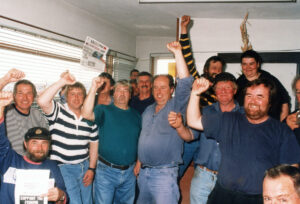
A few years before the blockade of Brittany Ferries, the Plymouth fishermen brought the daily workings of the MAFF (MMO) office to a standstill. Dave Pessell is centre back, with a moustache and a dark blue shirt.
Over the past 30 years and longer, the unity of the fishing industry at Plymouth has given rise to an impressive list of demonstrations against the unfairness of the Common Fisheries Policy (CFP).
Boats from around the South West, and beyond, travelled to Plymouth for whatever showdown was going to take place.
On Friday, 26 March, 1993, a fleet of Plymouth boats blockaded the entrance and exit of Brittany Ferries and, days later, many skippers were issued with court papers – but their anger towards the unfairness of the CFP wasn’t extinguished, and is still burning bright.
Against all odds, Plymouth’s fishing industry has strengthened, and over the past 30 years serious investments in its future have been made – and further investments continue. If Brexit is quashed, it is highly unlikely that the Plymouth men will lie idle and watch the demise of something that 52% of the British public voted for.
Now leader of Plymouth Trawler Agents, ex-trawlerman Dave Pessell was a kingpin throughout those many years of protest. He and his men left the authorities in no doubt that the Plymouth fishing industry – one that goes back many hundreds of years – will not submit.
Plymouth city folk are shocked by the current mess surrounding the exit of Britain from the European Union, and Dave Pessell believes that such uncertainty has already brought significant and damaging worries to all. Fishing News asked his opinion on what may happen to Brexit.
Dave Pessell said: “No one knows what is going to happen. What we do know is that, in the biggest democratic vote in our history, the British people voted to leave the European Union. Furthermore, following the referendum, MPs voted to respect and carry out the result of the people’s vote. Since that date, it has become abundantly clear that a significant number of our elected Remain politicians from all sides of the House of Commons have cynically set out to overturn the result of the referendum.
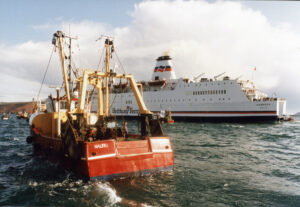
Nauru was one of many Plymouth trawlers that stopped the passage of Brittany Ferries in March 1993, an act that nearly landed the skippers in court – and at all times, they were aware of that risk.
“In the normal course of events, when we vote for an MP in a general election, we accept that they may not always do our bidding. In a one-off historic event like this, however, where MPs agreed to abide by the result, we can only treat those who seek to overturn it with utter contempt. It is almost beyond belief that these MPs consider themselves more important than the people whose vote they promised to respect.
“Unfortunately, on this occasion, the issue is much more important than the narrow confines of the British fishing industry. I understood why a lot of people voted to remain, but I understand no one who cannot accept the result of a democratic vote. I believe that had the Leave supporters lost the vote, as they were expected to do, they would have had a serious moan, but would have accepted the decision.
“If the democratic will of the people is overturned and we do not leave the EU, the UK fishing industry will be consigned to being a second-rate, poor cousin of the European fishing states for the foreseeable future, as it has been for the past 40 years. Sadly, the oft-stated statistic that fishing only accounts for 0.5% of GDP will be thrown at us by people who know the cost of everything and the value of nothing.
“The CFP continues to be a top-down, bureaucratic system of management, reliant on political expediency, cronyism and outdated techniques far-removed from the needs of managing wild fish stocks within a modern-day food industry. The CFP and CAP are two of the cornerstones of the EU, and their preservation is fundamental and vital to cementing a federal Europe. This comes way before any thought of a sensible and dynamic management system, and helps to explain why we have to put up with such nonsense as the current landing obligation.
“The sentiment of the landing obligation may be right, but that doesn’t mean we have to impose an unworkable welter of regulation which is totally impractical, doesn’t work, and doesn’t have the support of the industry. The EU then compounds this wretched legislation with all sorts of amendments, exceptions and exemptions, to try to make something tolerable that palpably didn’t work in the first place.
“In the South West of England, we suffer from a poor share of quotas, even in waters that we would naturally regard as our own. The cumbersome and archaic management system we are subject to means that tough decisions are delayed for years, until even the EU has to admit there is a problem. We are then saddled with prohibitive measures that cause real hardship to our fleet, like the bass restrictions.
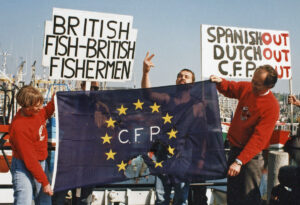
Sheryll Murray MP, left – then part-owner of a trawler – took part in this protest against the CFP.
“Under the present system, we have little or no general control over the vessels that fish in our waters, and therefore nobody takes responsibility for the stocks. Try telling South West fishermen that they need to conserve cod stocks, when for the past 40 years, the French have had 85% of the quota, and the British 5%. Oh, and by the way, the cod TAC was going to be set at zero, until they realised it would become a choke species immediately.
“South West fishermen do not wish to see all foreign vessels excluded from our waters. We simply wish to take responsibility for the stocks in them, and have control of the boats that fish those stocks, regardless of nationality. Unsurprisingly, we require a fairer share of the quotas. We require a more dynamic system of management – one that is regionally/zonally operated, and can respond at speed from the ground up, rather than the top down. It is a far cry from the EU fortress of cumbersome ineptitude. We will also require a strong economic link from the flagships that fish off our quota.
“Yes, we should have the zero to 12-mile limit solely for UK vessels. Earlier, I suggested that the 0.5% of GDP did not tell the whole story. Fish is not only a globally traded product, but fishing is the lifeblood of literally dozens of coastal communities around our island. The nation cannot thrive with the loss of any primary industry. Nothing could be more depressing than the thought of working coastal communities replaced by second-home owners and moribund fishing museums. It is a wonderful, wild, natural resource that deserves better treatment than it is given at present. The fish stocks belong to the nation, and should not be just the preserve of the wealthy.”
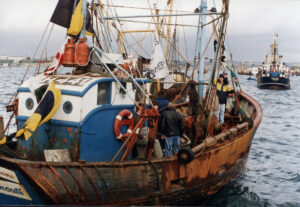
This Plymouth protest took place when John Selwyn Gummer MP became the fisheries minister. Boats from far and wide often took part in the protests.
Fishing News asked Dave Pessell how he would respond to the small number of fish merchants who do not support Brexit, saying that because the vast majority of fish caught in South West waters are exported to Europe, any resulting tariffs may seriously damage their business.
He answered, “Yes, there are worries, and of course I understand their frustrations at not knowing which way the decision will go. What I can assure them is that if Brexit goes ahead, there may be short-term, unpleasant disruption, but we have a first-class product that will be in demand, and the demands of customers soon overcome limited horizons. Ask the merchants of Billingsgate where much of their fish comes from. In brief, the answer is from all over the world. Believe me, whether Britain is in or out of the EU, European markets will always want British fish, and they will pay the extra price to get it.
“If Brexit is successful, we will almost certainly secure a better share of fish quotas, but that doesn’t hide the fact that we need access to the EU market. There will undoubtedly be a certain amount of bartering and, of course, in any form of negotiations, you rarely get everything you want.”
Fishing News asked whether, if Brexit goes ahead, possible retribution from EU fishermen and merchants would bring any long-term harm to the Plymouth industry.
Dave Pessell replied, “There may be short-term retribution, which usually tends to come from the French. It would be very unwise of the French to prolong protests if they wish to negotiate access when we become a fully independent coastal state.
“A friend of mine refers to the UK fishing industry as a ‘done-to’ industry. The people at the sharp end, whether they are fishermen or merchants, are rarely consulted, yet are subject to an ever-increasing burden of legislation. We now have a wonderful opportunity to put our industry in order, if the government can deliver. We will not get everything we want, but a good start will be that the people who legislate for our future will be those who understand how the industry works. There is considerable work to be done to put our own house in order. A little optimism, and a lot of courage, will see us over the line.”
Deal or no deal?
Staunch Brexiteer and leader of the South Western Fish Producers’ Organisation (SWFPO) Jim Portus is now ‘slightly less confident’ that, if the Brexit campaign is successful and the referendum vote is enacted, then Britain’s fishing industry will get the deal it was once promised, but he is ‘still standing and still fighting’.

Jim Portus (right), leader of the SWFPO, was a main player in the Save Britain’s Fish campaign, and led many protests like this one at Plymouth, dumping fish that would have been discarded at sea on the main road in Plymouth city centre, to highlight the CFP rule of quota management by dumping dead fish at sea.
He told Fishing News: “I am still working on the basis that the UK will leave the EU, and if everything in the political mayhem pulls with equal strain, although I don’t agree with it, prime minister Theresa May’s deal might go ahead. I do feel, however, that the catching industry may be sold a dummy, and end up no better off.
“We are keen to have full control of UK waters – sovereign control. It is vital. At the very least, we must have full control, with exclusive access, from the shore to the 12-mile limit for UK vessels only. A better share of the resources within the remainder of the British exclusive economic zone (EEZ) is also vital. These factors were promises, both throughout and since the referendum. Yes, in all likelihood the UK will be engaged in a quota-share system of some sort (with other countries), but it must be fairer than it is at present. Reciprocity must be equitable.
“In a scenario where a deal is agreed, we know that for the implementation period (to leave the EU), it will require us to have the same legislation as the EU, the same distribution, the same effort limitation, and the same marketing regulations that we have now. The best that can happen for the UK is that parliament begins its plans to remove/amend some of those regulations in 2020.
“The fisheries bill will enact every single piece of EU legislation that currently applies to our fishing industry. Personally, I find that sad, because it doesn’t allow for any changes to take effect immediately. For example, removing quota-hopping or ‘flag of convenience’ registration – it cannot be done immediately. At present, the European Court of Justice judgements rule all issues; our Merchant Shipping Act remains weak, and is unable to enforce the genuine ownership and economic links of British-registered vessels.
“So at present, and if a deal is passed, then for the transition period we experience all the ills of the CFP; we suffer from a poor quota distribution system of relative stability. With flagged vessels being a considerable part of the British fleet, foreign interests take all the economic benefits that they gain from fishing UK waters, and then take those gains to other countries.
“We may never see a time when there will be total control on vessel ownership, but I would like to see a concerted effort by whichever party is in government to ensure that British resources are then harvested for the benefit of the UK, and that the economic good comes to British fishing communities, rather than going overseas. The ownership of fishing vessels has to be sorted out.
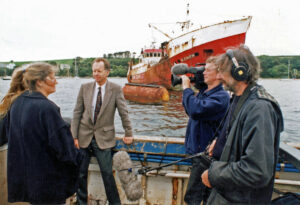
Jim Portus (centre) was interviewed by local television when, almost 30 years ago, the biggest fine to that day was imposed on the Spanish flag of convenience vessel Blenheim. It was also under detention by the MCA, but a few days later slipped away overnight. The vessel, under the name Blenheim, never returned to the UK. It was a hot topic at the time, and local fishermen had daubed Blenheim with graffiti saying ‘stop illegal fishing’.
“A 64-million-dollar question is, if we either crash out, or accept a deal and endure a transition period, what will become of the present fixed quota allocation (FQA) system when that ends?”
Jim Portus added that, although the FQA system has faults, most owners of vessels over 10m in length widely use FQAs as a currency, ‘even though it isn’t accepted as legal currency by the authorities’.
He added, “FQAs are used as currency in quota trading, and are used successfully. DEFRA has talked of replacing FQAs with effort limitation – days at sea – but why change the quota system when it works well?
“On a purely management basis, one may consider disadvantages to the quota system, but has the use of FQAs damaged fisheries resources? They haven’t, and the management of stocks by FQAs has, over the years, brought many stocks under the maximum sustainable yield (MSY), and more stocks are recovering further. There is no big incentive to change FQAs.
“People who wish to change the FQAs are those who feel disadvantaged by the system, the under-10s in the non-sector. There was a court case that the POs lost. The sector fleets lost quotas to the non-sector. There was direct redistribution of FQAs. FQAs are considered as an asset of the licence holder, so any moves in future to remove all or part of that asset would be met with legal implications for compensation.
“I cannot see how anybody will have anything to gain by dismantling one system and replacing it with another. If a future fisheries minister wishes to move FQAs to an effort limitation system, it should be done only after full and comprehensive consultation, and on a pro rata system where those assets are not challenged. If all they want to do is change from one unit of currency to another, my advice – and that of most others – is to stick with FQAs, which are units related directly to the amount of fish in the available quotas.
“We may have got used to the effort limitation scheme in the scallop and crab sectors, but it is a very blunt instrument of management, one that might be an even worse method of stock control if used in the whitefish sector.
“I remember very well the protests in London and the ports in 1993, when fisheries minister David Curry sought to introduce effort limitation on top of fish quotas. It did not end well for him, when the courts overturned his legislation.
“I also remember very well the Save Britain’s Fish rally in London in April 1996. Twenty years later, in 2016, I was proud to take a small part in the Thames flotilla for the referendum.
“The British fishing industry may be facing significant changes to its operational legislation post-Brexit, but it has faced many challenges in the past, and is prepared to stand up for itself proudly in the future.”

